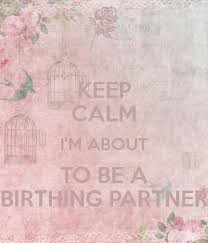As a prenatal massage therapist of nigh on twenty years, it has been my privilege to work with thousands of women in all stages of their pregnancies. Each woman is approaching the birth of her child (whether it be her first or fourth) with the same thoughts and sometimes worries, “how is it going to go?” and “I hope my man can cope”.
Birthing has traditionally been “women’s business”. The term ‘midwife’ is actually from the Old English original word being spelled ‘wif’, meaning woman and ‘mid’ meaning ‘with’. Therefore the word actually means “to be with a woman”. To be a midwife is to be with a woman during birthing. Therefore technically men can in fact be midwives, (so it shouldn’t be so unusual to meet a male midwife!) but just because they can, does it mean they should?
In the old days women laboured at home surrounded by close family members or friends and usually an experienced midwife. Meanwhile their husband would be shuttled away to another part of the house or yard, kept at a distance whilst their baby made their way into the world. Predominantly prior to the 1930’s birthing was usually out of a hospital attended by a female midwife. Increasingly in the latter part of the eighteenth century male physicians are reported to have begun attending births for the aristocracy in America and England.
As so often happens with “progress” common sense was left by the wayside, as it was only once labouring women were given access to hospital that women began to labour alone for long periods by themselves. Interestingly whilst they laboured alone in hospital beds, they were being cared for sporadically by midwives who were overseen by a male doctor. I remember talking to my grandmother about her birthing experience back in 1946 and she left me in open-mouthed disbelief as she recounted labouring alone on a hospital bed being told to “quiet down” as she muffled her birth noises with each contraction. Having attended a number of births myself, and gently massaging a labouring mama’s back, or whispering words of encouragement in her ear, I can only imagine the fear that my grandmother must have felt. To be alone, in pain and uncertain of the process of birth would have been more than I could have handled. There were no Dr Google searches or YouTube birthing videos to watch and prepare oneself back in the day. There was no “What to Expect When You’re Expecting” books or labouring techniques to read about. Women ventured into an unknown world of birthing with only the stories of other women to put the fear of God in their minds and hearts.
Once the pendulum began to swing the other way in the late 1960’s and 1970’s birthing with a partner in hospital started to become more common, which paved the way for a husband to begin to join in the action.
In some maternity waiting rooms lovingly referred to as “stork clubs” men have written journals of prayers (for a boy baby and the safety of their wife), emotions of anger and frustration at not knowing what was happening in the labour room, and reflections on what their life was going to be like moving forward. Men it would seem, even though they were now in the hospital, only had a foot in the door of the labour suite. Countless men feel useless and helpless in the birthing room, and just the pressure to grin and bear the experience. Some men even go so far as ensuring they are away for work, and “can’t get back in time” due to off shore postings or last minute emergencies. And for some this may just be a dreadful coincidence in bad timing, but for others it is a plausible excuse for not actually having to be in the room at all. (For more historical research see the work by J Leavett (2009) Make Room for Daddy).
Since the 1980’s when the overwhelming push to have men in the birthing rooms was at its peak (and subsequently became the norm), men found themselves in a pickle where they wanted to be there, but would prefer not to, but because it was “expected” they feel like they almost have no choice. Women these days expect and often demand their man to be in the room “just the two of us”, with thoughts of an intimate labour and delivery bonding the couple in birthing bliss. Delighting in the ability to enjoy back massages and diffused oils whilst gently swaying in a contraction-motivated movement to a carefully selected blend of the woman’s favourite music on their iPod.
In reality, unless the man is genuinely desiring to be in the birthing room, has a genuine interest and has read a lot about birth, attended a Calm Birth or Hypnobirthing class, he is probably ill-equipped for the noise, the blood and the intensity of emotion that is part and parcel of a birthing experience. A man who cannot appreciate the feminine power of a labouring woman, is probably not equipped for what he is walking into.
Many labouring women move from calm and well-mannered to a demanding ego maniac in the blink of an eye. “Get me ice”, “Massage here! Not there!” and even the most feminine and gentle of woman can be heard shouting expletives at her man just because he “got me into this situation!” Hormonal surges, increasing contractions, perceived bitchy midwives, doctors that are running late, “non-one is listening to me”, anaesthetists that don’t know how to move quickly and drugs that “don’t even work”, are all reasons why a mild mannered labouring woman will suddenly grow devil horns and get very very angry. For a man, it can be hard to see his partner in this state, when the natural urge he has is to “fix it”.
This is why I ask the question “do we expect too much of our men in the birthing suite?”
The role of a woman is to harness her feminine power and to naturally move with the ebbs and flows of her body’s unique rhythm. She will express delight and annoyance, as powerfully as she needs to in order to ride the timed wave of contraction after contraction.
The role of her supporters and midwife or doula is to gently respond, move, remain calm and to offer grace in all the emotions she will no doubt experience as her body and spirit unite to birth this baby. Without this firm circle of supporters, a birthing woman can experience fear in all its forms, which is known to increase pain sensations, induce panic, reduce blood flow to baby and cause all manner of complications that upset the natural rhythm. Traditionally it has been easier for a woman to be attended by women who embrace their feminine energy and offer grace to one of their own.
A man in the birthing room is required to embody his masculine energy. He needs to stand at the door and take a breath in, knowing he cannot make the woman’s experience anything different from what it will be: a masterpiece of life showing the awe and wonder and power in one birthing woman. For a man to want to witness this, I commend him. But for a man wanting to “change” something, whether it is to medicate and remove the pain from contractions, or to oppose experienced medical advice, or to dictate to the woman “what she needs” I would beg to argue. In my opinion a man is required to stand still and breathe as the woman dances around him in her mysteriously feminine ways. He is to guide her as she wails against the deepening contractions and to hold firm when she declares she has nothing left. He is to be her sounding board and her rock, her safe space to cry and her sure place to rest.
So how does he do that?
By resisting the urge to “fix her pain” or to take away her suffering, and to watch in awe as she navigates this rite of passage into motherhood. Sure he can hold her while she is racked with another wave of intensity, and he can feel her shake uncontrollably as she lets her body move with the force of nature doing her thing. But he is not to get angry, impatient or demanding, nor fight against nature in her full power, but to remain calm and supportive throughout.
Can a man be expected to resist his (un) natural state, and embrace his masculine power in equal measure to his woman’s feminine display? I would ask the same of a woman – can she be expected to resist her (un) natural urge to “get rid of this pain!” or to “go home” and to embrace the flow of energy moving through her body bringing her baby into the world?
Only with wisdom from experienced birthing support people such as doulas or midwives or friends, or family who know the true value of stepping into their own power. Through reading birthing wisdom and practice of meditation and stillness, through quiet reflection on what it means to birth a child, from listening to stories, from watching others, and from an open hearted attitude to the experience of birth as a rite of passage rather than something needing to be endured and forgotten.
Can a man be in the birthing room? Of course. But the real question is does he want to be, and can he allow himself to become his masculine form as his woman becomes her exquisite feminine expression?


